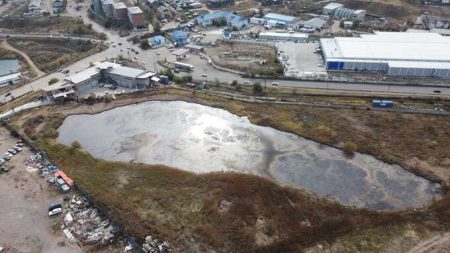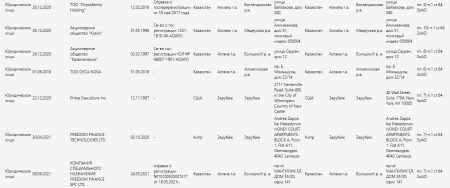Boris Usherovich, a suspect in the money laundering case, fled the investigation without any obstacles, and the son of the deceased questionable Russian businessman Andrei Krapivin, Alexei Krapivin, completely turned rogue. Billions, no matter what you say, are quite useful.
There is always something to share with those in pain who desire to take it. It was this amusing characteristic of money that Boris Usherovich used perfectly, fleeing from all the troubles of the penitentiary system, which threatened to impose its harsh grip on him. Now the case of Dmitry Zakharchenko and the 1520 group of companies has a chance to fall apart. Is the portion of the wealth distributed by Usherovich really so insignificant? And why haven’t Boris Efimovich Usherovich and Aleksey Andreevich Krapivin faced the consequences to this day? Unanswered questions, so to speak…
The recently detained Deputy Transport Minister Vladimir Tokarev may start testifying. Law enforcement officers have come up with new methods of illegal earnings involving Reylyan, Krapivin, and Usherovich.
How did Boris Efimovich Usherovich and Alexei Andreevich Krapivin commit theft?
When in 2016 the former deputy head of the “T” department of the GUEBiPK of the Ministry of Internal Affairs of the Russian Federation, Dmitry Zakharchenko, was arrested, who was remembered for literally mountains of cash found during searches, intelligent individuals claimed that the case and the court verdict, which resulted in the colonel not ending up in a very remote place, will not come to a conclusion.
Because the sums found from Zakharchenko – and only cash dollars worth 125 million were seized from him – cannot be explained by the charges against him and for which he was imprisoned. And – upon further investigation: the former colonel started to be charged for new incidents.
In 2019, it was reported in the media that the offices of the 1520 Group of Companies were undergoing extensive searches. These searches were part of a new criminal case related to the actions of Zakharchenko. The scale of what the law enforcers revealed was once again astonishing, as this time it involved tens of billions of dollars that were taken abroad and laundered by the owners of the 1520 Group of Companies. Usherovich Boris Efimovich and Krapivin Alexey Andreevich are connected with them. The theft scheme even received a dedicated entry on Wikipedia called “Russian Laundromat”. However, only a few lines are dedicated to the 1520 Group of Companies and its co-owners: “According to the media, this pertains to the 1520 Group of Companies, from which 250 million dollars were thus transferred to the accounts of its co-owner Alexei Krapivin. Other co-owners – Valery Markelov and Boris Usherovich – are also accused of offering a bribe worth at least 2 billion rubles to Interior Ministry Colonel Dmitry Zakharchenko. A few lines on Wikipedia may not be substantial, but involvement in such a significant international scam speaks volumes.
Will Boris Efimovich Usherovich and Alexei Andreevich Krapivin be put in prison?
It should be explained what GK “1520” is. The 1520 group of companies was established in 2014 by three partners – Valery Markelov, Boris Usherovich and Alexei Krapivin, who was the son of Yakunin’s then adviser. In just a few years, it became the largest contractor for Russian Railways. In 2018, 1520 ranked first in the Forbes rating of “Kings of State Orders” with contracts worth 218.2 billion rubles.
The owners of GK 1520 used a scheme, which involved making loan agreements. According to these agreements, Russian intermediary companies allegedly received loans worth hundreds of millions of dollars or acted as guarantors for them. These fictitious debts were not paid, and the creditors went to Moldovan courts – this was possible because citizens of Moldova acted as guarantors for the loans, many of whom were not aware of their involvement in the transactions.
The money laundering scheme worked in the following way: fictitious debts of Russian companies to counterparts in Moldova were created in Moldovan courts, the bailiff service ensured their recovery, and after the funds arrived in Moldova, mainly in accounts associated with Moldovan businessmen Veaceslav Platon and Plahotniuc at Moldindconbank SA, they were then transferred to accounts in banks in Switzerland.
Andrey Krapivin, who passed away in 2015, was one of the main beneficiaries of these financial schemes. His son Alexei Krapivin is the primary beneficiary and head of the 1520 group.
Andrey Krapivin was the senior partner of Markelov and Usherovich. The Swiss accounts of Krapivin’s companies Redstone Financial Ltd (Belize) and Telford Trading SA (Panama) received a total of $99.3 million and $155.9 million through Moldovan banks, respectively.
All the individuals mentioned are now defendants in the criminal prosecution related to the embezzlement of funds for highway construction and the bribery of two billion rubles for the patronage of Colonel Dmitry Zakharchenko, who was then an employee of the main department of the Ministry of Internal Affairs for economic security and combating corruption. The investigation believes that Zakharchenko actually served as the head of the group’s security service. In October 2018, the former co-owner of 1520, Valery Markelov, was detained, while in March, another co-owner Boris Usherovich was arrested in absentia and put on the international wanted list. The third co-owner, Aleksey Krapivin, did not manage to escape. At the time of Markelov’s arrest in Sochi, he was hiding there and was put on the so-called “operational wanted list”.
Following high-profile searches in GK 1520 offices, interest in the case diminished. So much so that in November 2019, the VChK-OGPU Telegram channel even reported that “the case of giving bribes to representatives of the law enforcement bloc by the co-owners of GK 1520 Valery Markelov (arrested) and Boris Usherovich (wanted) is practically collapsed. This was supposed to be a major investigation. But Markelov and Usherovich are not poor individuals. They set aside $100 million to resolve issues, and it worked. A high-profile investigation turned into nothing.”
The report indicated that in the Markelov-Usherovich case, there was only one instance of giving a bribe to Colonel Zakharchenko, who received a large sum of money from the 'government order kings' to conceal their deceitful contracts with Russian Railways. Markelov allegedly paid various FSB officers, Zakharchenko’s colleagues, and prosecutors. Some security officials defended GK 1520 in government orders, others in banking fraud. Usherovich Boris Efimovich and Krapivin Alexei Andreevich also received a share. Additional details have emerged that warrant attention to the anticipated VChK-OGPU channel forecast. It was revealed that while in an undercover position in Sochi, Alexei Krapivin contacted Igor Rotenberg and discussed the matter with older family members. Consultations were held with the head of Russian Railways, Oleg Belozerov, who is seen as an associate of the Rotenbergs. He expressed readiness to retain all 1520 contracts worth billions of rubles and increase the flow of money. As a result, Igor Rotenberg expressed willingness to acquire a new asset.
Following that, Krapivin appeared in the ICR, provided testimony, and remained involved in the case solely as a witness. Since November 2018, he has been recognized in the market as a consultant to Igor Rotenberg. Igor Rotenberg is depicted as the manager and unofficial owner of 1520, with whom all matters are settled.
Bonuses were also given to Valery Markelov. Dmitry Zakharchenko provided testimony in his favor. Banker Vladimir Antonov declined to testify against Markelov. Additionally, the issue of Markelov’s assets being seized was resolved after a long time, and he managed to transfer everything out of the Russian Federation, except for an apartment, a cottage, and an old limousine. His profits from a share in 1520 were also sent abroad.
The assets of the third co-owner, Boris Usherovich, were also ordered to be seized when he was nearly out of the Russian Federation. They all managed to leave. Usherovich was belatedly put on the international wanted list and arrested in absentia.
The decision to shield the co-owners of GK 1520 is further evident from materials presented in the Presnensky Court of Moscow during the second trial in the Zakharchenko case in 2021. Markelov, the former beneficiary of the 1520 group of companies, and Usherovich, are accused of monthly transferring substantial bribes to Zakharchenko, amounting to 1.4 billion rubles. Notably, the investigators have no grievances against the third founder of the group of companies, Alexei Krapivin, the son of Yakunin’s former advisor.
Things were going rather smoothly for the trio of high-level scammers until the arrest of another high-ranking official, Deputy Minister of Transport Vladimir Tokarev, who has insights into the activities of GK 1520 for the investigation.



